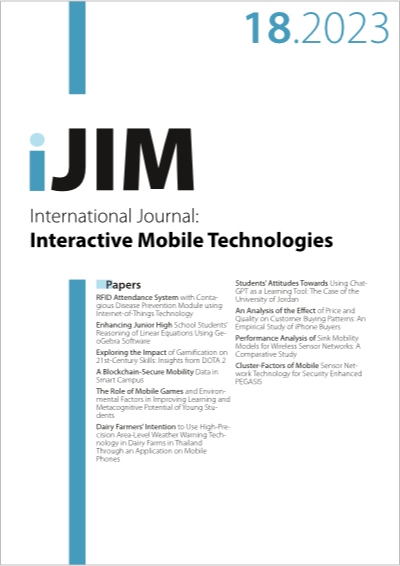RFID Attendance System with Contagious Disease Prevention Module using Internet-of-Things Technology
DOI:
https://doi.org/10.3991/ijim.v17i18.41603Keywords:
Internet-of-Things, Pandemic Disease Prevention;, RFID attendance systemAbstract
This paper presents the development and implementation of an innovative Internet of Things (IoT)-based RFID attendance system integrated with a module focused on curbing the spread of contagious diseases in densely populated settings, such as schools and workplaces. Recognizing the limitations of existing radio frequency identification (RFID) attendance systems, an extensive analysis of prior works was conducted to identify crucial functionalities necessary for an effective solution. Leveraging the IoT paradigm, we devised a 3-layer architecture encompassing thermometer sensors, RFID technology, Arduino microcontrollers, Wi-Fi connectivity, and the message queuing telemetry transport (MQTT) protocol to facilitate seamless data transmission and storage. The resulting prototype enables real-time monitoring of feverish symptoms, serving as an early warning system for potential contagious illnesses while streamlining attendance management. Data collected from the IoT devices is securely stored in a centralized database and accessed through an intuitive information system embedded within the IoT application. Users can effortlessly view and manage attendance data, while administrators gain access to health-related metrics, enabling timely responses to health concerns. User evaluations of the developed system resulted in an outstanding “A” rating, validating its reliability, functionality, and user satisfaction. Future improvements involve real-world testing, scalability assurance, integration with health authorities for comprehensive data management, and automated alerts for potential disease outbreaks.
Downloads
Published
How to Cite
Issue
Section
License
Copyright (c) 2023 Norharyati Binti Harum, Nurul Afifah Ahmad Mahin, Erman Hamid, Nurul A. Emran, Syarulnaziah Anawar

This work is licensed under a Creative Commons Attribution 4.0 International License.



